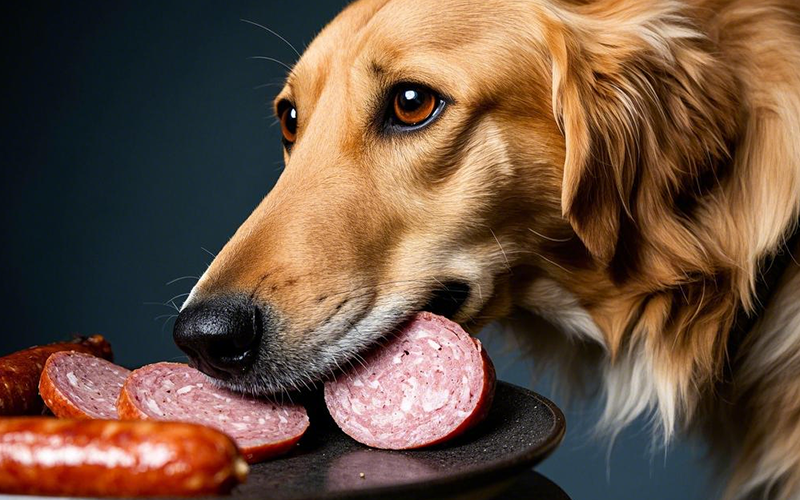Can Dogs Eat Salami? Understanding the Risks and Safety Concerns
- 6 Mar 2025 10:07
Salami is a popular snack for humans, but when it comes to your dog, you may wonder: Can dogs eat salami? The short answer is no—salami is not safe for dogs. While it might seem like an occasional treat, there are several important reasons why you should avoid giving your dog salami.
In this article, we’ll explore:
✅ Why salami is not a good choice for dogs
🚫 The health risks associated with feeding salami to dogs
🐾 Safe alternatives to salami for your dog

Why Salami is Not Safe for Dogs 🚫
⚠️ High Salt Content
Salami is packed with salt, which can be harmful to your dog, especially if they consume it regularly.
High levels of salt can cause salt poisoning in dogs, leading to symptoms like vomiting, diarrhea, excessive thirst, and in severe cases, kidney damage or seizures.
⚠️ Excessive Fat and Calories
Salami is very high in fat and calories, which can contribute to obesity in dogs.
Consuming too much fatty food can also cause pancreatitis, a painful inflammation of the pancreas that can lead to serious health problems.
⚠️ Spices and Seasonings
Salami often contains spices such as garlic and onion, which are toxic to dogs.
Even small amounts of garlic or onion can cause gastrointestinal upset, red blood cell damage, and anemia in dogs.
⚠️ Preservatives and Additives
Salami may contain preservatives and artificial ingredients like nitrates, which are harmful to dogs.
These preservatives can cause health issues and contribute to digestive problems in your pet.
Health Risks of Feeding Salami to Dogs 🚫
⚠️ Risk of Obesity
Due to its high-fat content, feeding your dog salami can lead to weight gain and obesity, especially if given in large quantities or regularly.
Obesity in dogs can lead to a range of health issues, including joint problems, heart disease, and diabetes.
⚠️ Pancreatitis
The high-fat content in salami can put your dog at risk for pancreatitis. This is an inflammation of the pancreas that can be very painful and requires immediate veterinary care.
Symptoms of pancreatitis include vomiting, abdominal pain, loss of appetite, and lethargy.
⚠️ Digestive Upset
Salami’s spices, particularly garlic and onion, can cause significant digestive upset in dogs.
In some cases, these ingredients can lead to more severe complications, such as hemolytic anemia or kidney damage if consumed in large amounts.
What to Do if Your Dog Eats Salami?
If your dog accidentally consumes a small amount of salami, you likely don’t need to panic. However, if they eat a significant portion, here’s what you should do:
Monitor for symptoms – Watch for signs of vomiting, diarrhea, excessive thirst, or lethargy.
Contact your vet – If your dog starts showing signs of distress, or if they consumed a large amount of salami, contact your veterinarian immediately.
Prevention is key – Going forward, make sure to keep salami and other unsafe foods out of your dog’s reach to prevent accidental ingestion.
Safe Alternatives to Salami for Dogs 🦴
While salami should be avoided, there are plenty of safe and healthy treats you can offer your dog. Here are some alternatives to consider:
✔ Lean Meats (Cooked)
Chicken, turkey, and beef are great lean protein options for dogs. Always ensure the meat is cooked thoroughly without any added salt, spices, or seasonings.
✔ Carrots and Apples
Carrots and apples are nutritious and safe treats for dogs. They are low in calories and high in fiber, making them perfect for healthy chewing.
Just be sure to remove any seeds from apples before giving them to your dog.
✔ Peanut Butter (Unsweetened)
Many dogs love peanut butter as a tasty treat. Ensure the peanut butter is unsweetened and doesn’t contain any xylitol, a sugar substitute that is toxic to dogs.
✔ Dental Chews
Dental chews are designed to clean your dog’s teeth while also satisfying their urge to chew. Many are made with natural ingredients and are formulated to improve your dog’s dental health.
Final Verdict: Can Dogs Eat Salami?
🚫 No, dogs should not eat salami.
Salami is high in fat, salt, and preservatives that can be harmful to your dog’s health.
Spices like garlic and onion in salami can cause toxicity in dogs and lead to serious health problems.
💡 Looking for safe and reliable pet health advice? Try PettureX, a 24/7 AI pet assistant that can help you with quick answers and recommendations for your dog’s health, including safe treats and food options.
Keep your dog safe by choosing healthier alternatives to salami and always consult your pet health assistant for advice on the best diet and treats for your furry friend! 🐾
Related

Crunchy Curiosity: Can Dogs Safely Snack on Pork Rinds? A Deep Dive
- 21 Apr 2025
Pomegranate Seeds and Pooches: A Deep Dive into Whether Dogs Can Safely Indulge
- 21 Apr 2025
Can Dogs Eat Peaches? Vet Explains Benefits, Cyanide Risks & Safe Serving
- 16 Apr 2025
Can Dogs Eat Mulberries? Vet Explains Safety, Benefits & Potential Risks
- 16 Apr 2025
Can Dogs Eat Mozzarella? Vet Explains the Cheesy Truth (Risks & Benefits)
- 16 Apr 2025
Can Dogs Eat Maple Syrup? The Sugary Truth & Why Vets Advise Against It
- 16 Apr 2025
Can Dogs Eat Mango Skin? Vet Explains Why It's a Risky Chew!
- 16 Apr 2025
Can Dogs Eat Mac n Cheese? Vet Explains Why This Comfort Food Is Unsafe!
- 16 Apr 2025
Can Dogs Eat Liver? Vet Guide to This Nutrient-Dense Organ Meat (Benefits & Risks!)
- 16 Apr 2025
Can Dogs Eat Lamb? Vet Insights on This Nutritious Meat Option
- 16 Apr 2025
